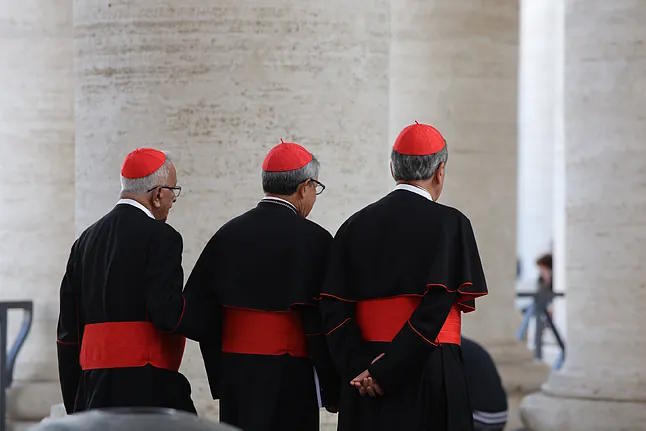At least six candidates with papal potential are among the 133 cardinals gathering today in the secretive conclave at the Sistine Chapel to choose the successor of Pope Francis. The Archbishop of Algiers, Jean-Paul Vesco, was the one who mentioned the magic number in the antechamber of the last Cardinals' Congregation before the proclamation of Extra omnes ("Everyone out"), which will mark the seclusion and the first and only vote on Wednesday afternoon.
There are other names being mentioned - like the Italians Matteo Zuppi and Fernando Filoni, the Maltese Mario Grech, the Swede Anders Arborelius, the Congolese Fridolin Ambongo, or the Filipino Pablo Virgilio Ambo David - but the race seems decided from the start. However, there is room for surprise candidates not initially on the list, as was the case with John Paul II or with Francis himself, "the Pope who came from the end of the world," who was elected on the second day and on the fifth vote.
Despite the apparent control projected by the Holy See, the conclave is taking place amid "great confusion," at least according to the diagnosis of the Indonesian cardinal, theologian, and philosopher Ignatius Suharyo Hardjoatmodjo, one of the latest to join the General Congregation, where voices have been heard in favor of a pontiff who somehow continues the legacy of Francis and serves as a "bridge, shepherd, and guide" for the Church in a world shaken by turbulence.
However, there is also a background noise in favor of a profile different from that of Francis: more moderate in doctrinal aspects and not necessarily as charismatic, more of a manager than a shepherd, with the ability to build a new North-South alliance in an increasingly global Church. The fragmentation of the conclave, with cardinals from 71 countries, is another element complicating this process compared to previous ones. Eight out of ten elector cardinals were appointed by Francis during his 12-year pontificate, and many of them did not know each other until two weeks ago.
The cardinals' last relatively free outing, with the opportunity to take selfies with the faithful in St. Peter's Square, took place this Tuesday at noon, after the General Congregation. At 4:30 p.m. this Wednesday, they will process to the Sistine Chapel, invoking the assistance of the Holy Spirit. The master of Pontifical Liturgical Celebrations, Diego Ravelli, will then proclaim the Extra omnes, and the doors will close for the first vote, which will likely serve as a test.
From Thursday onwards, there will be up to four daily votes, two in the morning and two in the afternoon, and so on until a candidate receives the support of two-thirds of the 133 cardinals (89 votes). Every two votes, the ballots will be burned in the chapel's stove, and the smoke coming out of the chimney (the emblematic comignolo) will be the signal sent to the outside world.
If the smoke is black, it will indicate that no candidate has achieved majority support. The white smoke will be the final indication of "Habemus Papam". The average duration of the last conclaves has been three days, and despite some cardinals predicting that this will be a short conclave, there is also growing concern that it may drag on longer than expected.
The conclave has been preceded by a relative controversy due to a campaign attempting to undermine the candidacy of Pietro Parolin, who serves as the conclave's president and has been considered a top contender. The Holy See had to debunk as fake news the information from the conservative American portal CatholicVote.org about a supposed fainting spell caused by a health issue of the 70-year-old Vatican Secretary of State during last Wednesday's General Congregation. Criticisms against Parolin for his role in the agreement between the Vatican and China for the appointment of bishops have also intensified in recent days.
Another orchestrated campaign on social media has been directed directly at the most charismatic cardinal in the conclave, Luis Antonio Tagle, nicknamed "the Asian Francis." The portal BishopAccountability.orgquestioned his ability to prevent sexual abuse by priests if he were to become Pope. The attacks on social media reached a point where the Conference of Filipino Bishops had to issue a statement defending his role when he "acted decisively in helping victims of sexual abuse" during his time as Archbishop of Manila.
During the conclave votes, deprived of their mobile phones, the 133 cardinals will avoid interference and pressure from the outside world, although the dynamics of the conclave itself can lead to sudden falls of favorites. In 2013, the Archbishop of Milan, Angelo Scola, led in the votes with the support of around fifty cardinals, but he was unable to surpass that ceiling due to a block from some of the religious. When a candidate is blocked and perceived as incapable of reaching the two-thirds majority, the baton passes to another aspirant.
If after three days of scrutiny (or twelve votes) the cardinals have not reached an agreement to elect the next pontiff, the sessions will be suspended for a day, dedicated "to prayer and free discussion," plus a "brief spiritual exhortation" by the first deacon.
